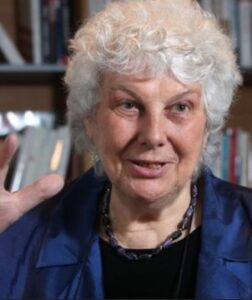Eileen Barker (b. 1938)

Eileen Barker was born in Edinburgh, UK in 1938. Her first academic education was in the field of Drama, and prior to her academic career she pursued an acting career, playing a variety of roles in England and abroad. Her career path shifted as she earned a First Class Honors degree in Sociology and a PhD, both from the London School of Economics (LSE). After receiving after receiving her BSc(Soc) that she assumed a position in sociology that she retained through her career as a Professor of Sociology, with special reference to religion. She subsequently continued her career as an emerita at LSE following her retirement in 2003. In addition to her academic work and teaching, Barker held a number of administrative posts, both at the departmental and university levels. Over the course of her career, she has produced a remarkable record of scholarship, several hundred publications in several dozen languages, hundreds of professional lectures and presentations at professional meetings in over seventy nations. Barker has received numerous academic honors in her home country, including election as a Fellow of the British Academy (1998) and as an Officer of the British Empire (2000). Internationally, she is one of the major founding scholars in the study of emerging and alternative religions.
Barker has made major contributions to the study of emerging and alternative religions in several ways. Her accomplishments begin with her own scholarship in this area. Her first book, The Making of a Moonie: Choice or Brainwashing?, which grew out of her dissertation work, has become a classic, directly addressing the “cult/brainwashing” controversy that dominated much of the study of new religions in the 1960s and 1970s. Her book won the Outstanding Book Award from the Society for the Scientific Study of Religion in 1985. The importance of her legacy is demonstrated by the publication of two volumes celebrating her career and scholarship. Barker developed a special interest in the formation of new religious groups in Eastern and Central Europe. She was a founding member of the International Study of Religion in Eastern and Central Europe Association and contributed to scholarship developing that area of study.
Second, Barker has served as an important representative of new religions studies to the broader study area of religion and sociology. She was elected to serve as president of two of the most important academic societies in the study of religion in the U.S.: President of the Society for the Scientific Study of Religion in 1991 and as President of the Association for the Sociology of Religion in 2001. In Europe, she was elected as Chair of the British Sociological Association’s Sociology of Religion Study Group in 1985 and of the London Society for the Study of Religion in 1994.
Third, Barker has been a primary ambassador to organized opponents of new religious groups, “cult watching groups.” She regularly participated in and gave presentations at the annual conferences of organizations such as the International Cultic Studies Association (ICSA). She served Cultic Studies Review editorial board. She earned a reputation among her colleagues for evenhandedly explaining the dynamics of both new religious groups, oppositional groups, and the dynamics of the conflict between them.
Barker has consistently engaged in public education through her career. In 1988, she founded INFORM (Information Network Focus on Religious Movements) and became the Chair of its Board of Governors. In 2019, the future of INFORM was assured when its headquarters moved to King’s College, London. Its mission of providing accurate, scientifically-based information about “minority religions and sects” remains unchanged. Barker served on the Board of Governors until 2022. The year after the founding of INFORM, Barker published New Religious Movements: A Practical Introduction (1989). The volume has been reissued five times and translated into at least a dozen languages. Like INFORM, this book seeks to offer thoughtful, basic, evidence-based information that can be used by government officials, church leaders, media representatives, and the general public. It was for her combination of scholarly work and public education that in 2000 Barker received the Martin E. Marty Award for Contributions to the Public Understanding of Religion.
Selected Publications:
Barker, Eileen. 1984. The Making of a Moonie: Choice or Brainwashing? Oxford: Blackwell.
Barker, Eileen. 1989. New Religious Movements: A Practical Introduction. London: HMSO.
Beckford, James and James Richardson, eds. 2004. Challenging Religion: Essays in Honour of Eileen Barker. London: Routledge.
Borowik, Irena, ed. 2006. Religions, Churches and Religiosity in Post-Communist Europe. Krakow: Nomos.
